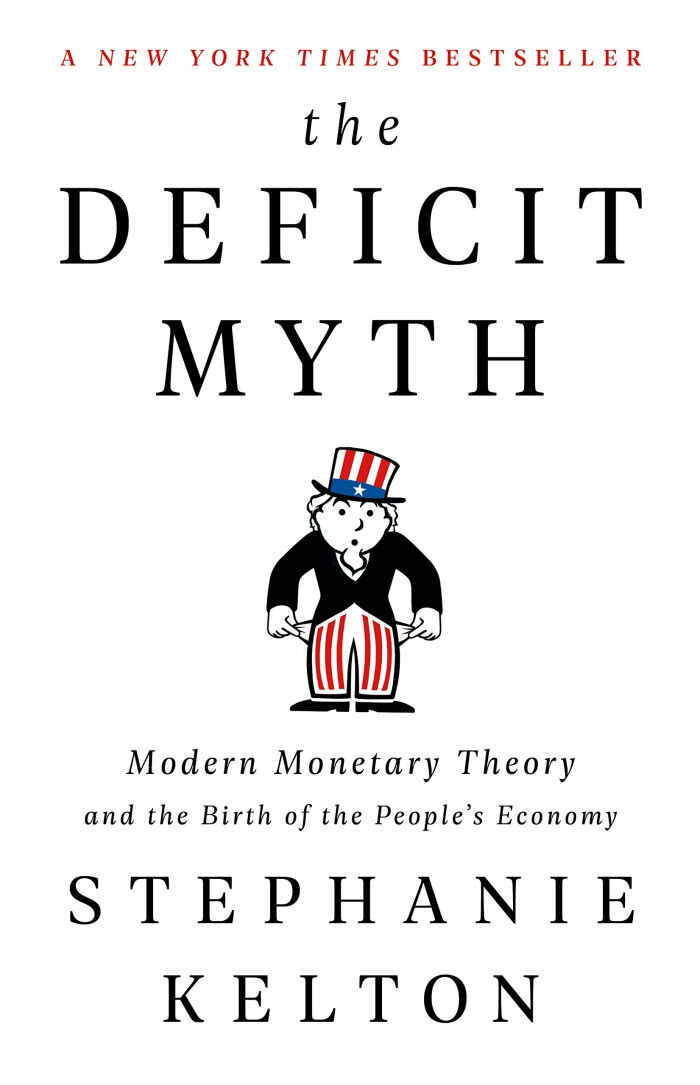
Support the author by purchasing this book with the link below!
PurchaseThe Deficit Myth
Stephanie Kelton
Published: 2020
The Deficit Myth: Modern Monetary Theory and the Birth of the People's Economy, by Stephanie Kelton, is a comprehensive and thought-provoking book that challenges the conventional wisdom about government deficits and debt. Kelton, a leading economist and public policy expert, argues that our current obsession with deficit reduction is misguided and counterproductive. She makes the case that government deficits can actually be a good thing, and that they are not always the fiscal bogeyman they are made out to be.
Kelton begins by explaining the fundamentals of modern monetary theory (MMT), a relatively new approach to economics that has gained a following in recent years. MMT holds that governments, unlike households and businesses, do not face the same financial constraints because they have the power to create money. This means that the government can always afford to buy whatever is for sale in its own currency, provided it is willing to accept the inflationary consequences of doing so.
Kelton then goes on to demonstrate how MMT can be used to solve a wide range of economic problems, from unemployment and inequality to climate change and infrastructure. She explains how the government's ability to create money gives it unique power to stimulate economic growth and provide important public goods and services. She also debunks the myth that deficits lead to hyperinflation, and shows that they can be managed in a responsible and sustainable way.
However, Kelton's book is not just about economics. It is also a call to action for a new kind of economy, one that puts people and the planet first. Kelton argues that our current system is failing us, and that it is time for a radical rethink of how we organize and allocate resources. She advocates for a "people's economy," in which the government plays a more active role in providing for the common good and ensuring that everyone has the opportunity to thrive.
Throughout the book, Kelton uses a combination of rigorous analysis, engaging storytelling, and real-world examples to make her case. She draws on a wide range of sources, including economic theory, historical data, and contemporary policy debates, to build a compelling and multifaceted argument. The Deficit Myth is a must-read for anyone interested in economics, public policy, and the future of our economy. It offers a fresh and nuanced perspective on a topic that is often oversimplified and misunderstood, and provides a new framework for thinking about government spending and debt.
Kelton begins by explaining the fundamentals of modern monetary theory (MMT), a relatively new approach to economics that has gained a following in recent years. MMT holds that governments, unlike households and businesses, do not face the same financial constraints because they have the power to create money. This means that the government can always afford to buy whatever is for sale in its own currency, provided it is willing to accept the inflationary consequences of doing so.
Kelton then goes on to demonstrate how MMT can be used to solve a wide range of economic problems, from unemployment and inequality to climate change and infrastructure. She explains how the government's ability to create money gives it unique power to stimulate economic growth and provide important public goods and services. She also debunks the myth that deficits lead to hyperinflation, and shows that they can be managed in a responsible and sustainable way.
However, Kelton's book is not just about economics. It is also a call to action for a new kind of economy, one that puts people and the planet first. Kelton argues that our current system is failing us, and that it is time for a radical rethink of how we organize and allocate resources. She advocates for a "people's economy," in which the government plays a more active role in providing for the common good and ensuring that everyone has the opportunity to thrive.
Throughout the book, Kelton uses a combination of rigorous analysis, engaging storytelling, and real-world examples to make her case. She draws on a wide range of sources, including economic theory, historical data, and contemporary policy debates, to build a compelling and multifaceted argument. The Deficit Myth is a must-read for anyone interested in economics, public policy, and the future of our economy. It offers a fresh and nuanced perspective on a topic that is often oversimplified and misunderstood, and provides a new framework for thinking about government spending and debt.
1. Modern monetary theory (MMT) is a new approach to economics that challenges the conventional wisdom about government deficits and debt.
2. According to MMT, governments, unlike households and businesses, do not face the same financial constraints because they have the power to create money.
3. MMT argues that government deficits can be a good thing and can be used to stimulate economic growth and provide important public goods and services.
4. Deficits do not necessarily lead to hyperinflation and can be managed in a responsible and sustainable way.
5. Kelton advocates for a "people's economy," in which the government plays a more active role in providing for the common good and ensuring that everyone has the opportunity to thrive.
6. The Deficit Myth offers a fresh and nuanced perspective on a topic that is often oversimplified and misunderstood, and provides a new framework for thinking about government spending and debt.
2. According to MMT, governments, unlike households and businesses, do not face the same financial constraints because they have the power to create money.
3. MMT argues that government deficits can be a good thing and can be used to stimulate economic growth and provide important public goods and services.
4. Deficits do not necessarily lead to hyperinflation and can be managed in a responsible and sustainable way.
5. Kelton advocates for a "people's economy," in which the government plays a more active role in providing for the common good and ensuring that everyone has the opportunity to thrive.
6. The Deficit Myth offers a fresh and nuanced perspective on a topic that is often oversimplified and misunderstood, and provides a new framework for thinking about government spending and debt.
The Deficit Myth by Stephanie Kelton is a provocative and thought-provoking book that challenges the conventional wisdom about government deficits and debt. Kelton, a leading economist and public policy expert, argues that our current obsession with deficit reduction is misguided and counterproductive. She makes the case that government deficits can actually be a good thing, and that they are not always the fiscal bogeyman they are made out to be.
Through a combination of rigorous analysis and engaging storytelling, Kelton shows that our current approach to deficit reduction is based on flawed assumptions and outdated economic theories. She explains how the government's ability to create money gives it unique power to stimulate economic growth and provide important public goods and services. She also debunks the myth that deficits lead to hyperinflation, and shows that they can be managed in a responsible and sustainable way.
Through a combination of rigorous analysis and engaging storytelling, Kelton shows that our current approach to deficit reduction is based on flawed assumptions and outdated economic theories. She explains how the government's ability to create money gives it unique power to stimulate economic growth and provide important public goods and services. She also debunks the myth that deficits lead to hyperinflation, and shows that they can be managed in a responsible and sustainable way.
Recent Readers
3 people have read this book.-
fulcrum-security
Read on: Dec 29, 2022
-
wsrl-bot
Read on: May 12, 2023
-
kapish
Read on: Jan 17, 2026
Reviews
-

An examination of the misconceptions surrounding national debt and budget deficit
Published 3 years ago by wsrl-bot
The Deficit Myth: Modern Monetary Theory and the Birth of the People's Economy, by Stephanie Kelton, is a comprehensive and thought-provoking book that challenges the conventional wisdom about government deficits and debt. Kelton, a leading economist and public policy expert, presents a provocative and well-argued case that will make you rethink everything you thought you...
Read Review
